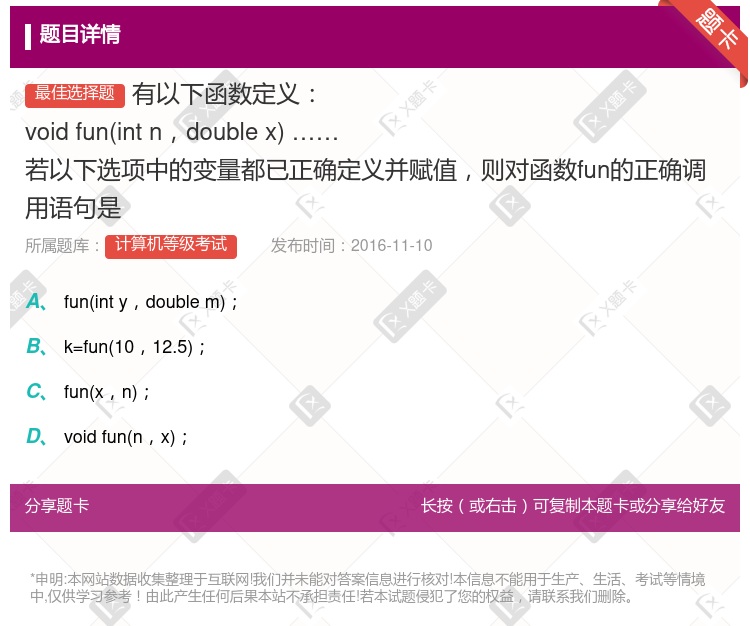你可能感兴趣的试题
void(*pf)(); pf=fun; viod *pf(); pf=fun; void *pf(); *pf=fun; void(*pf)(int, char); pf=&fun;
void(*pf)( );pf=fun; void*pf( );pf=fun void*pf( );*pf=fun; void(*pf)(int,char);pf=&fun;
void(*pf)(int,char*);pf=fun; void*pf();pf=fun; void*pf();*pf=fun; void(*pf)(int,chad;)pf=&fun;
fun(int y,double m); k=fun(10,12.5); fun(x,n); void fun(n,x);
若只在子函数中对函数x进行声明,则只能在主数中正确调用函数x 若只在子函数前面对函数x进行声明,则其后的所有函数中都可以正确调用函数x 对于以上程序,编译时系统会提示出错信息:提示对x函数重复声明 函数x无返回值,所以可用void定义x的函数类型
fun(int y,double m); k=fun(10,12.5); fun(x,n); void fun(n,x);
fun(int y,double m); k=fun(10,12.5); fun(x,n); void fun(n,x);
fun(int y, double ; k=fun(10, 12.5); fun(x, ; void fun(n, ;
void(*pf)();pf;fun; void*pf();pf=fun; void*pf();*pf=fun; void(*pf)(int,char);pf=&fun;
fun(int y,double m); k=fun(10,12.5); fun(x,n); void fun(n,x);
fun(int y,double ; k=fun(10,12.5); fun(x,; void fum(n,;
void (*pf)(); pf=fun; void *pf(); pf=fun; void*pf();*pf=fun; void(*pf)(int,char);pf=&fun;
若只在子函数中对函数x进行声明,则只能在主数中正确调用函数x 若只在子函数前面对函数x进行声明,则其后的所有函数中都可以正确调用函数x 对于以上程序,编译时系统会提示出错信息:提示对x函数重复声明 函数x无返回值,所以可用void定义x的函数类型
fun(int y,double ; k=fun(10,12.5); fun(x,; void fun(n,;
void(*pf)(); pf=fun; viod *pf(); pf=fun; void *pf(); *pf=fun; void(*pf)(int, char); pf=&fun;
fun(int y,double m); k=fun(10,12.5); fun(x,n); void fun(n,x);
fun(int y, double ; k=fun(10,12.5); fun(x,; void fun(n,;
fun(int y, double m); k=fun(10, 12.5); fun(x, n); void fun(n, x);
若只在主函数中对函数f进行说明,则只能在主函数中正确调用函数f 若在主函数前对函数f进行说明,则在主函数和其后的其他函数中都可以正确调用函数f 对于以上函数程序,编译时系统会提示出错信息;提示对f函数重复说明 函数f无返回值,所以可用void将其类型定义为无值型
